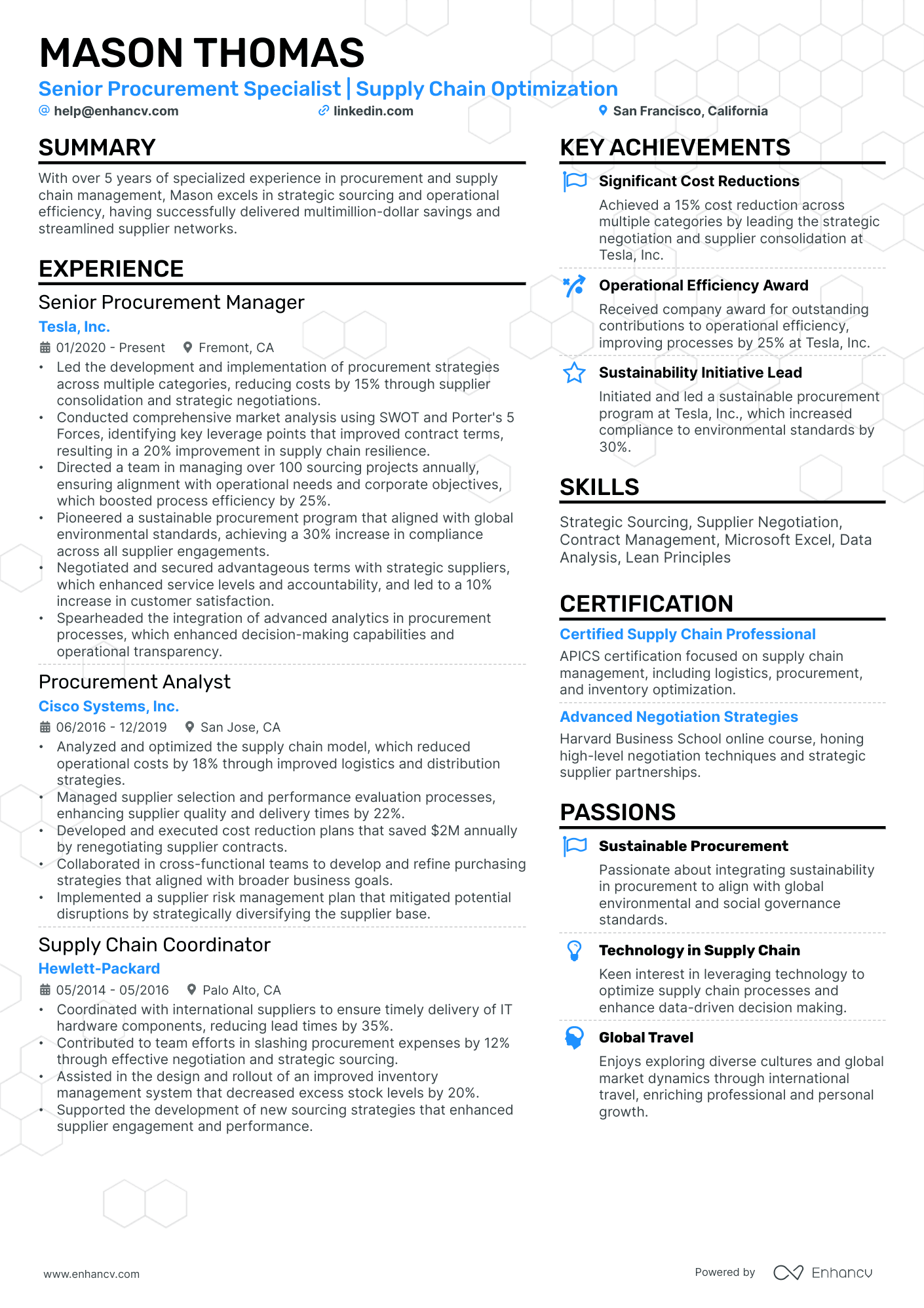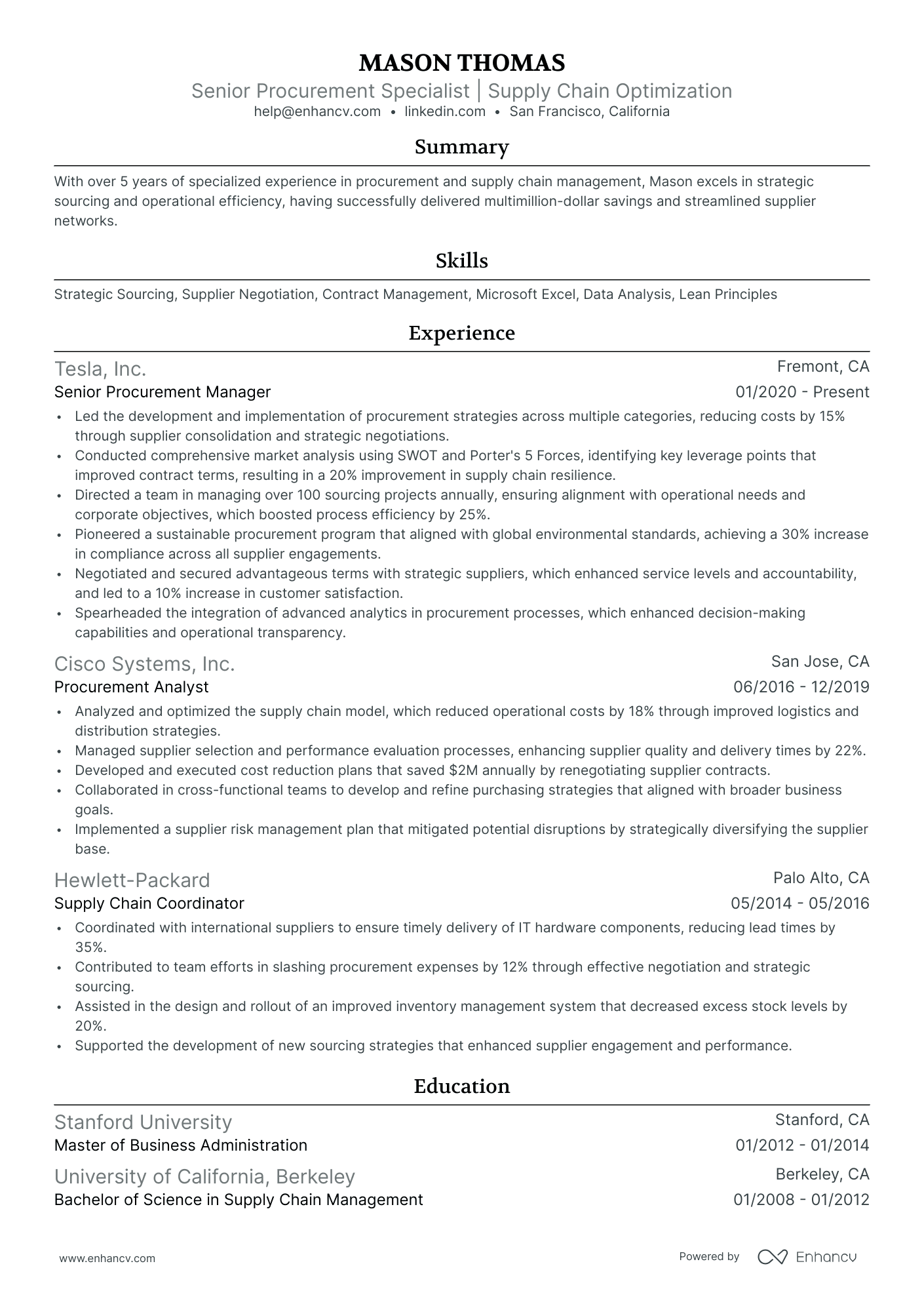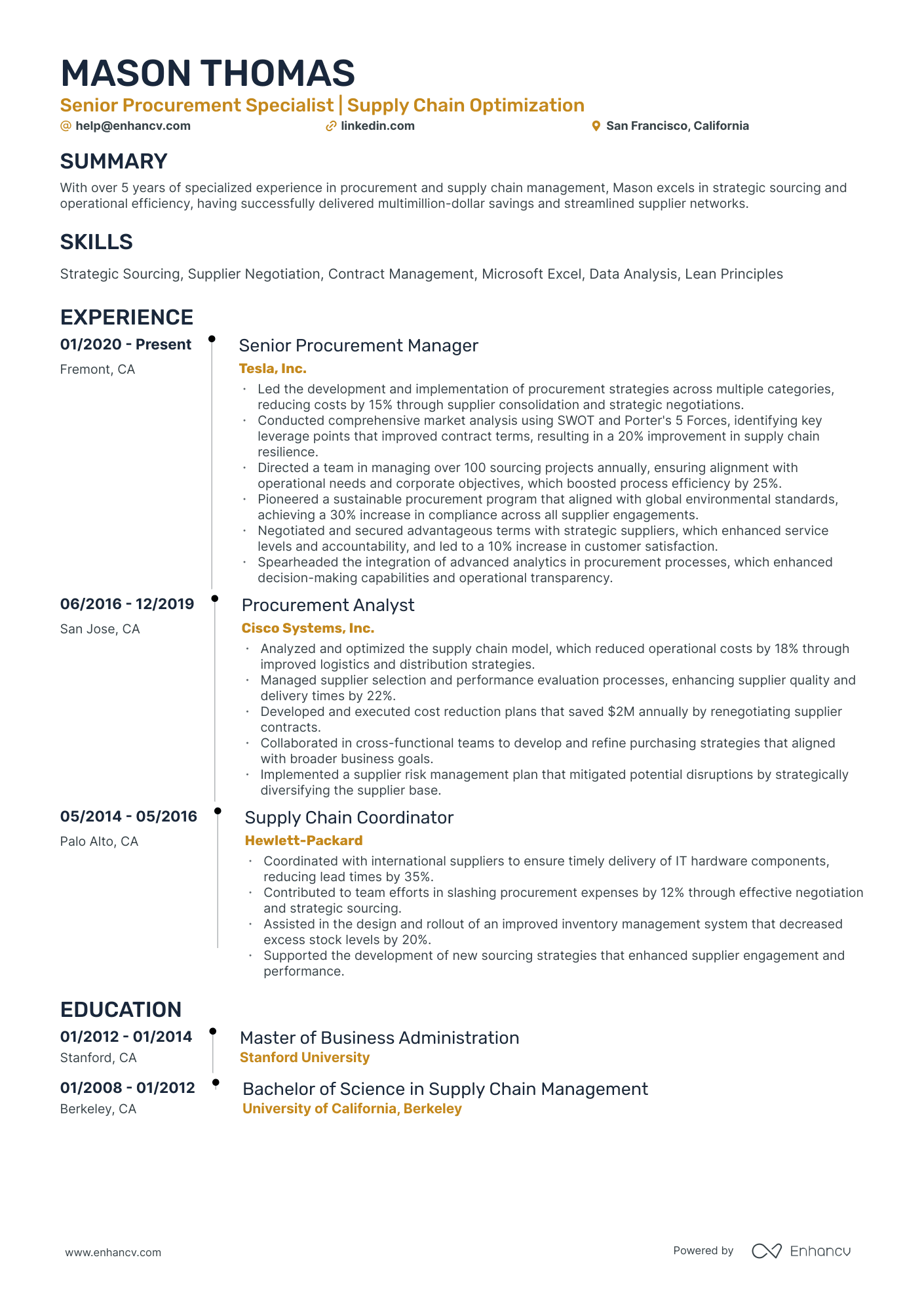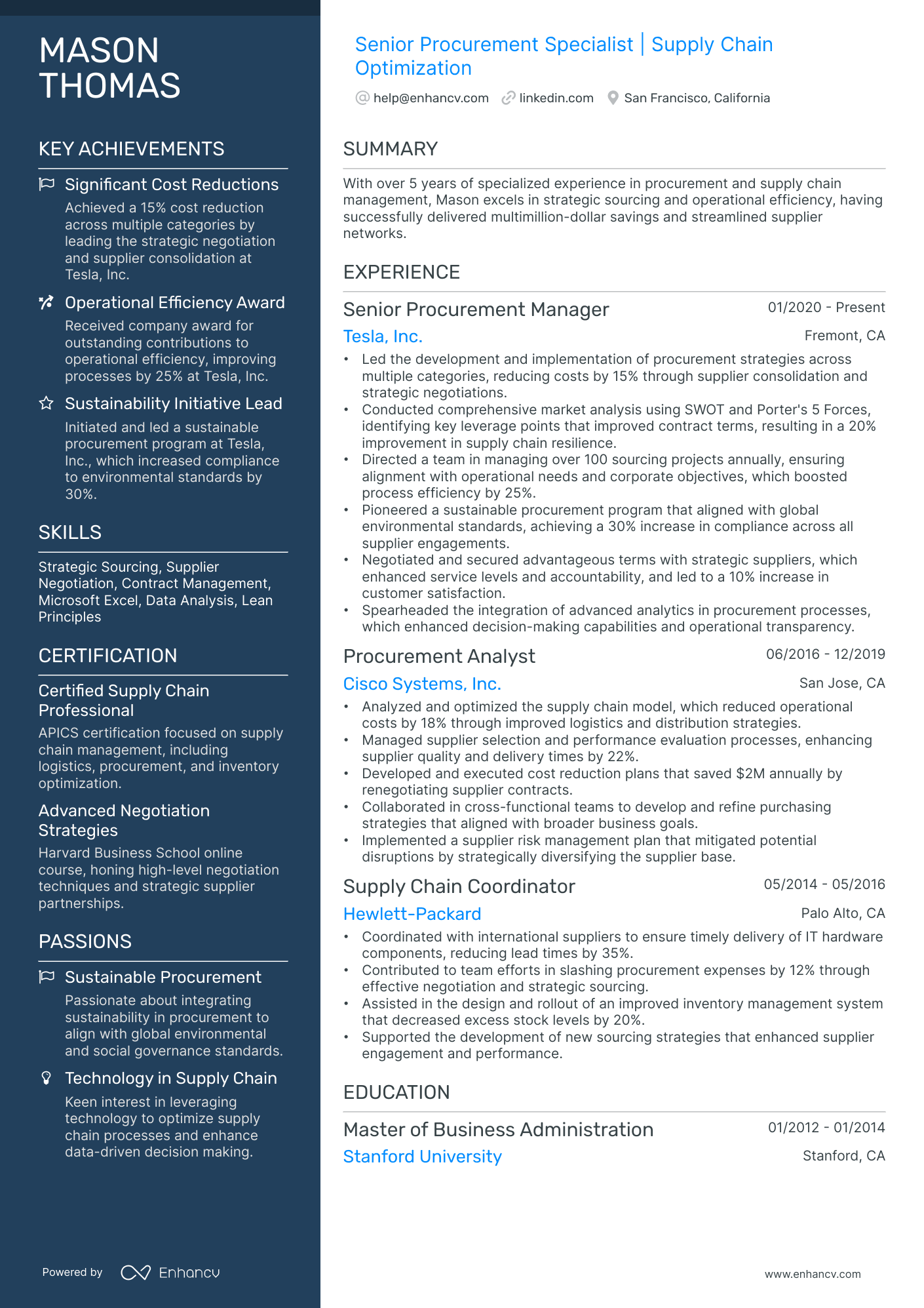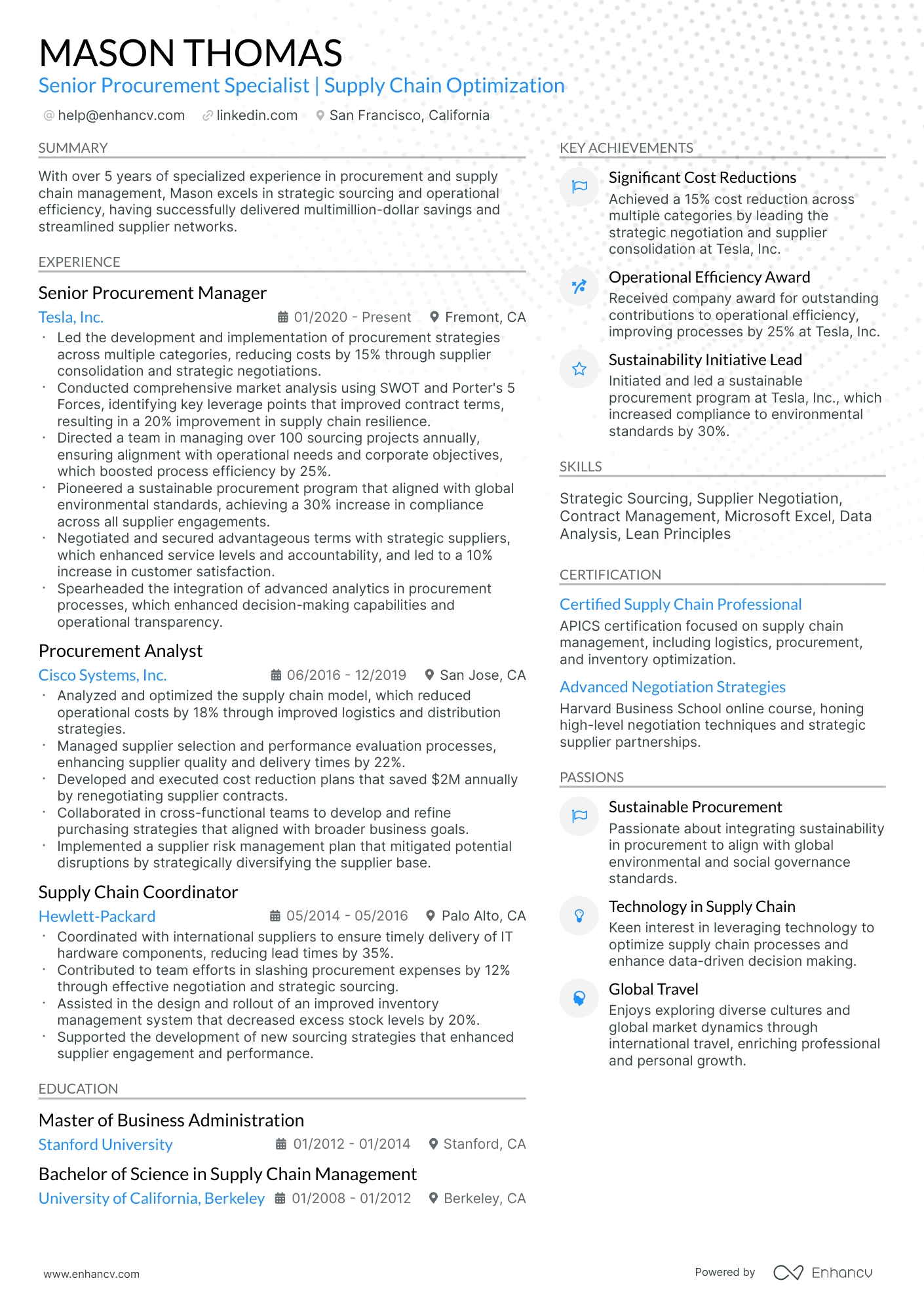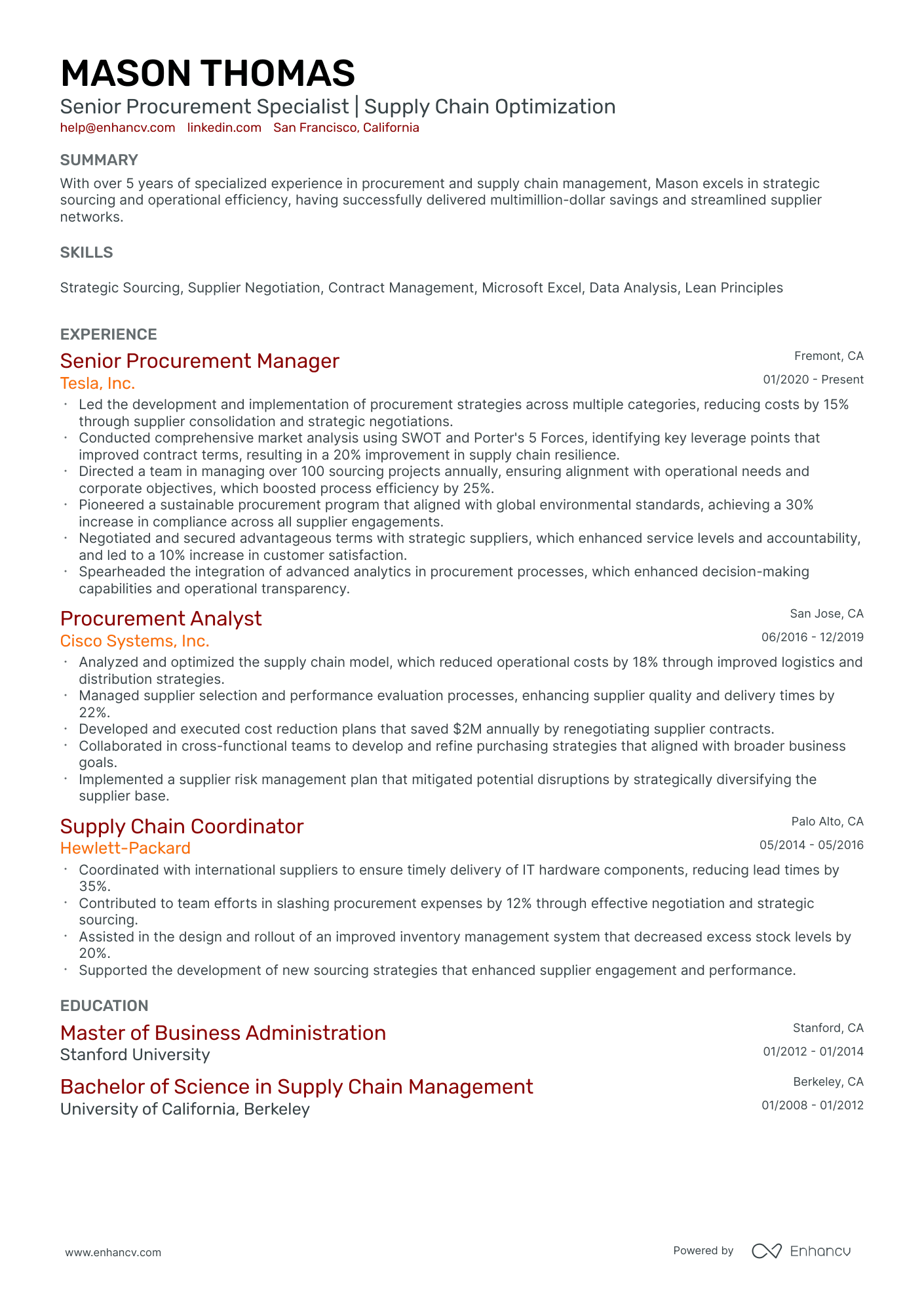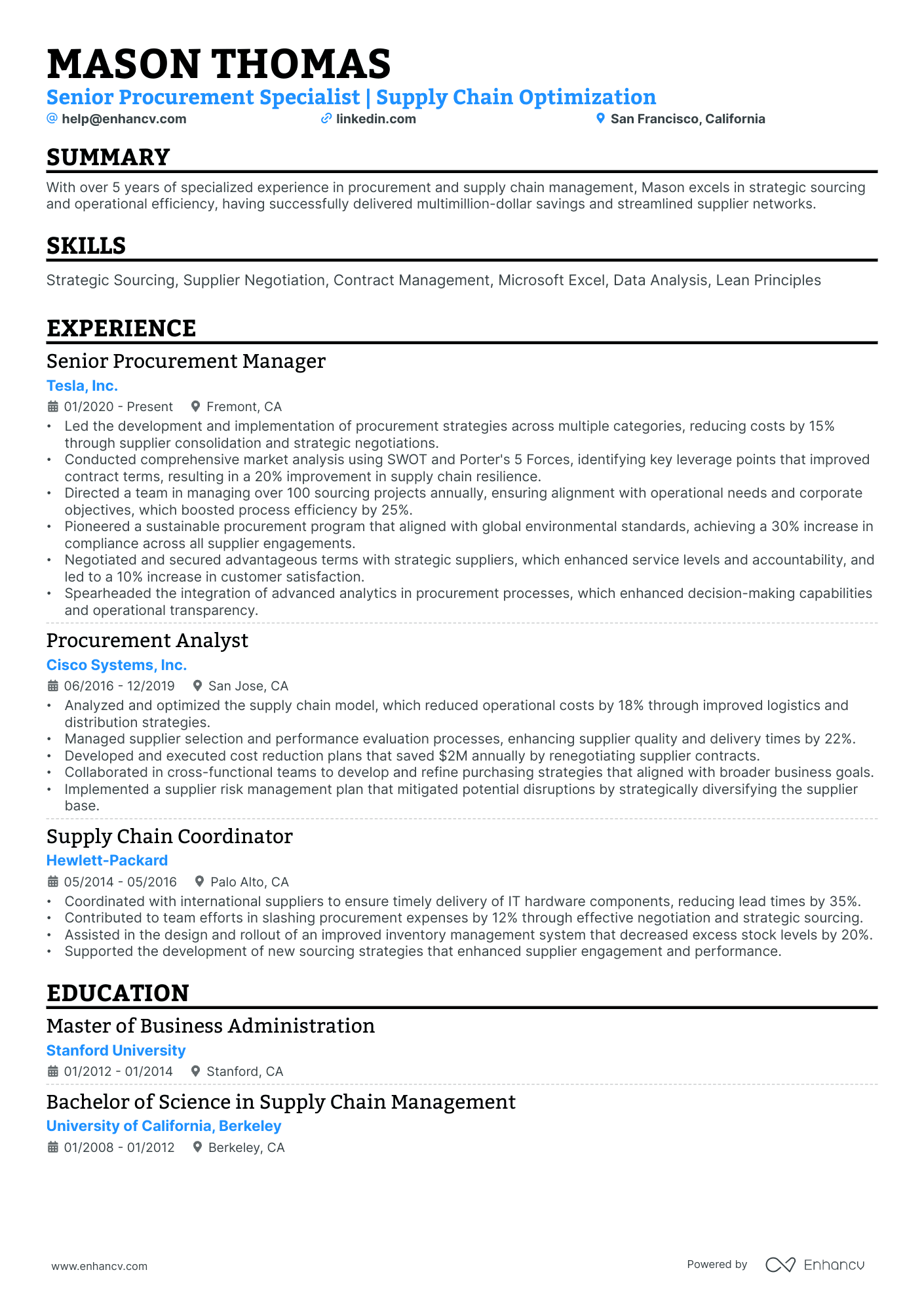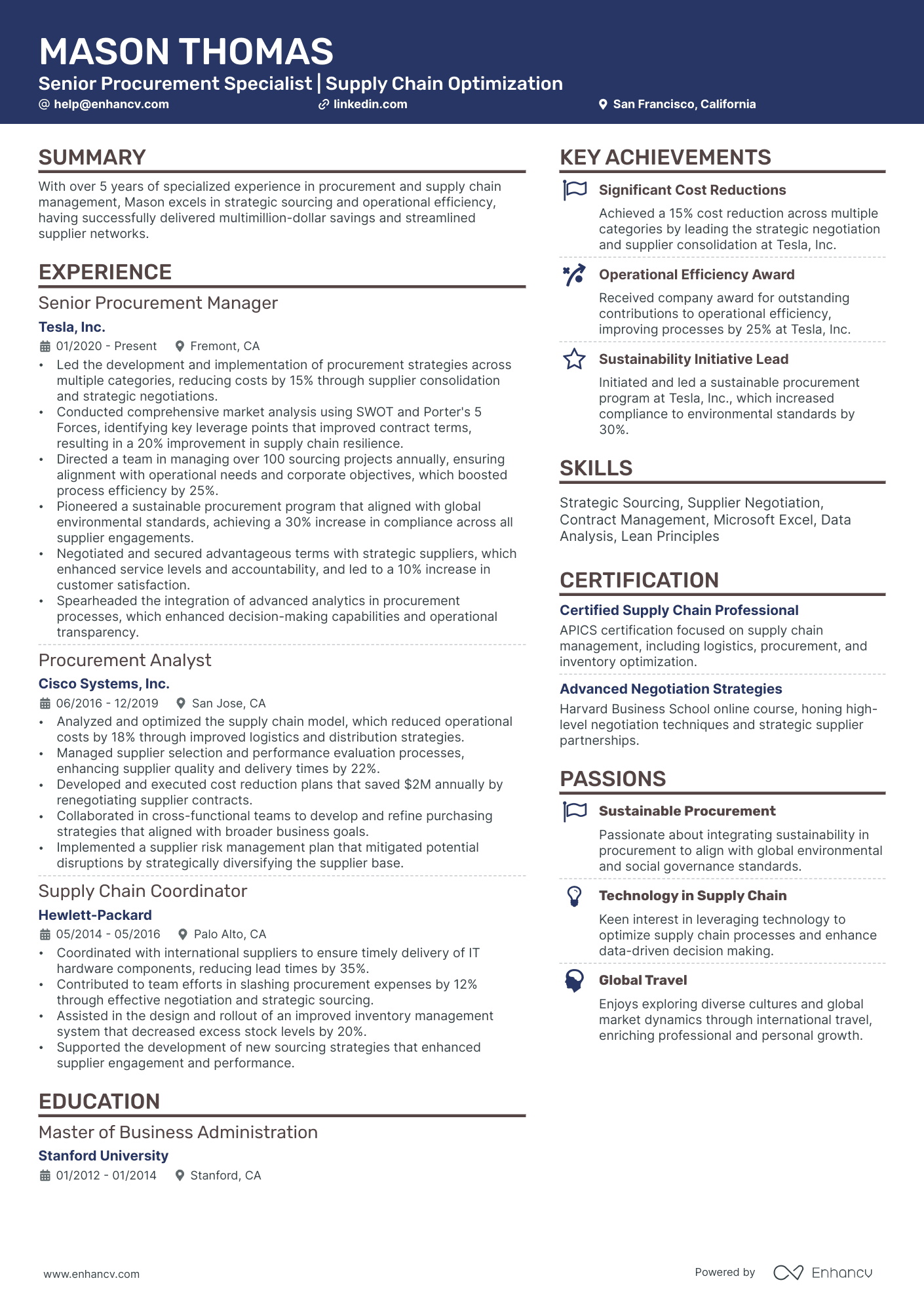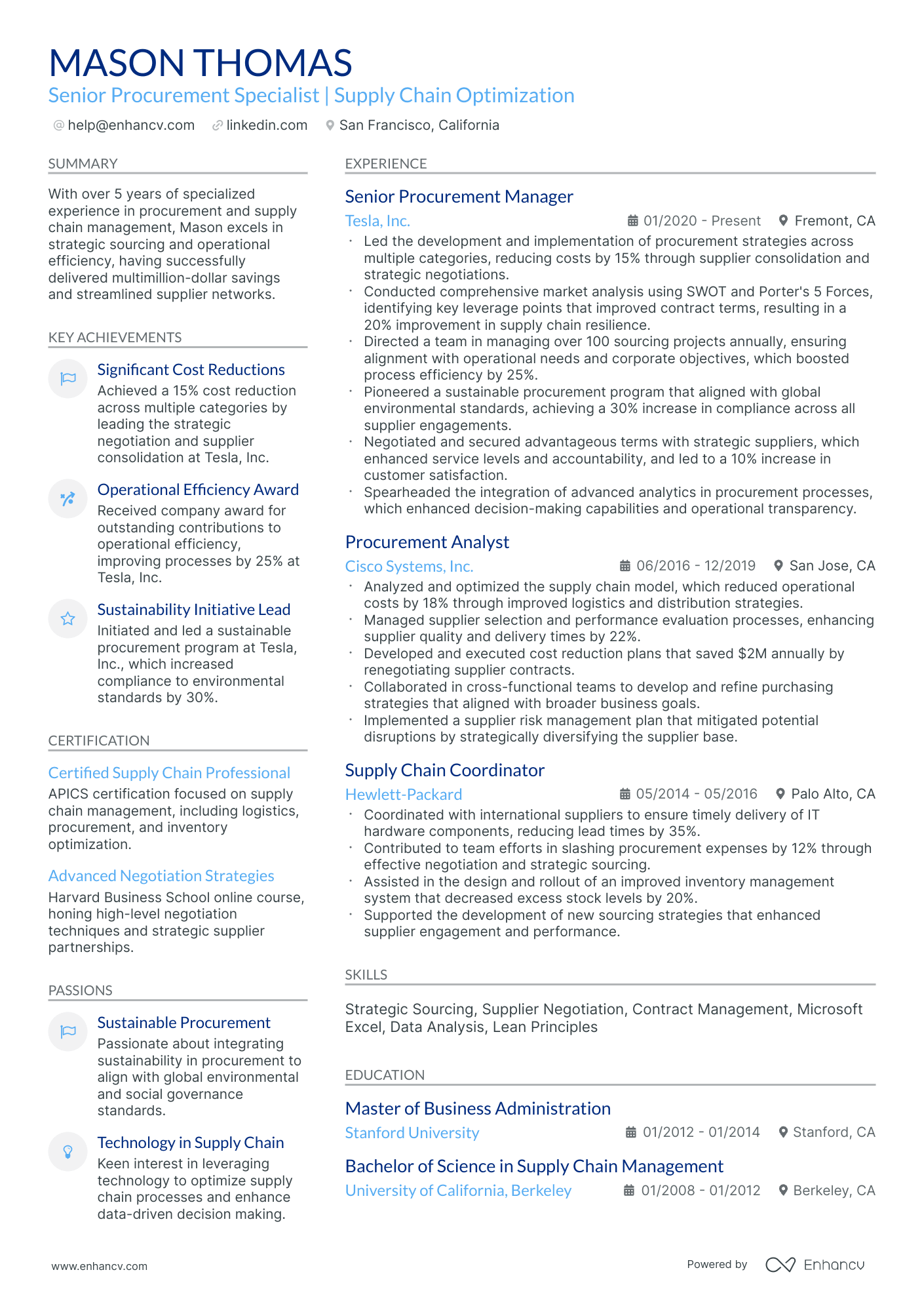As a procurement manager, you know that there is always a problem to be solved, a puzzle to put together, and at times a fire that needs putting out. Yet, for those in the right environment, the role of a procurement manager offers high salary potential. Also, it’s a plus that the skills you develop are transferable across various industries, opening doors to myriad career paths.
In this dynamic role, each day brings new challenges that are as rewarding as they are demanding.
Crafting your procurement manager resume for this role should mirror the precision of strategically organizing a warehouse. Every section should be carefully structured and detailed to show your skills and experiences, ensuring you're well-prepared to tackle any logistical challenge.
This guide shows how to connect your procurement achievements to your future goals, showcasing your leadership potential.
Key takeaways
- Opt for a clean, simple template that allows your qualifications to stand out without distractions.
- Tailor your resume to each job posting by using keywords and highlighting experiences that align with the job requirements.
- Open your resume with a concise summary or objective that highlights your experience, skills, and career objectives, specifically designed for procurement management.
- List both hard skills related to procurement techniques and software, and soft skills like negotiation and relationship management.
- Emphasize procurement-related certifications like CPSM and CSCP to demonstrate your specialized knowledge and commitment to the field.
- Include degrees and coursework relevant to supply chain management or business, which are crucial for a procurement manager role.
To get started, let’s examine a practical procurement manager resume example to outline the key elements and strategies for creating a compelling leadership profile.
Procurement manager resume sample
For procurement managers with busy schedules, the example resume below serves as a quick, adaptable template. If time is tight, the Enhancv resume builder offers an efficient way to create a polished, professional resume.
Alex Johnson
Procurement Manager
(512) 555-399X | alex.johnson@email.com | @LinkedIn | Chicago, IL
Summary
Strategic and results-driven procurement manager with over 12 years of experience in optimizing supply chain operations, cost reduction, and vendor management. Proven ability to drive efficiency through data analysis, strategic sourcing, and supplier negotiations. Adept at building strong supplier relationships, ensuring compliance, and leading cross-functional teams to meet organizational goals and deliver measurable results.
Experience
Procurement Manager
Global Manufacturing Inc., Chicago, IL
August 2018 – Present
- Spearheaded procurement operations with an annual budget of $50M, achieving a 20% cost reduction through strategic sourcing and contract renegotiations.
- Conducted supply market analyses using SWOT and other models, mitigating risks and identifying opportunities for a 15% increase in efficiency.
- Established vendor management programs, enhancing supplier relationships and ensuring on-time delivery rates of 98%.
- Led cross-functional teams to implement new procurement software, reducing purchase cycle times by 25%.
- Developed and enforced procurement policies to ensure compliance with legal and regulatory standards.
Senior Procurement Specialist
United Supply Co., Chicago, IL
June 2013 – July 2018
- Managed supplier selection and negotiations for contracts totaling $30M annually, achieving an average savings of 18%.
- Oversaw the implementation of inventory control measures, reducing overstock by 22% and minimizing waste.
- Analyzed procurement data to forecast demand and streamline purchasing processes, improving operational efficiency by 20%.
- Collaborated with internal stakeholders to align procurement strategies with company objectives, increasing department alignment and satisfaction scores.
Education
Bachelor of Science in Supply Chain Management
University of Illinois, Urbana-Champaign
Graduated: May 2013
Certifications
- Certified Professional in Supply Management (CPSM), 2021
- Project Management Professional (PMP), 2022
Skills
- Strategic sourcing
- Vendor negotiation and management
- Supply chain optimization
- Budgeting and cost control
- Procurement software (Ariba, SAP)
- Data analysis and forecasting
- Compliance and risk management
Languages
- English (Native)
- Spanish (Working proficiency)
Let’s explore how to structure your procurement manager resume to effectively underscore your leadership skills and accomplishments.
How to format a procurement manager resume
Selecting the appropriate resume format is key to ensuring your application as a procurement manager catches the eye. Here are three main formats to consider:
- Reverse chronological resume: Best for those with a robust background in procurement management, this format presents your job history from the most recent to the oldest.
- Functional resume: Ideal for those new to procurement, career changers, beginners, or those with employment gaps, this format focuses on your skills over your job history.
- Combination resume: This format blends the strengths of both chronological and functional resumes, allowing you to showcase your top skills and accomplishments first, followed by a brief employment history. It’s particularly effective for aligning your experiences with the specific demands of the procurement manager role you are applying for.
To ensure your procurement manager resume stands out to recruiters, consider these pro tips:
- Select a modern resume template and avoid designs that can be distracting. Simple templates help highlight your achievements clearly.
- For a clean and organized CV, ensure your resume margins are between 0.5 and 1 inch to reflect your attention to detail.
- Choose subtle, professional colors like blue or gray to convey stability without overpowering the document.
- Use readable fonts such as Arial, Lato, or Rubik, sized between 10 and 12 points. Use a different style for headers to neatly separate sections.
- Keep your resume to one page if you have less than ten years of experience. If you have a rich history of significant projects, a two-page resume is acceptable.
- Begin with a header that includes your name, job title, contact information, and link to your LinkedIn profile.
- Always save your resume as a PDF instead of a DOC file to keep the layout consistent across devices.
Tailoring your resume to underline your procurement skills and experiences effectively boosts your appeal to potential employers.
We advise you to avoid including a photo on your resume, as including one leads to 88% of resumes being rejected. In many countries, such as the United States, adding a photo is not standard practice and can decrease your chances of landing a job interview.
Think your resume is ready? Test it with our free AI resume checker to ensure it meets industry standards.
Is your resume good enough?
Drop your resume here or choose a file. PDF & DOCX only. Max 2MB file size.
Improve your job application by including these vital resume sections.
The top sections on a procurement manager resume:
- Contact information: This is crucial for allowing potential employers to contact you to arrange interviews or inquire further about your procurement management qualifications.
- Professional summary: This is important as it provides a concise overview of your relevant work history, qualifications and skills, tailored to the procurement manager position.
- Key skills: Highlighting your key capabilities and competencies directly related to procurement management can grab the recruiter's attention.
- Work experience: Here is where you detail your past roles and achievements related to procurement, from managing vendor relationships to implementing cost-saving strategies.
- Education and qualifications: Essential for confirming your academic and professional accomplishments, such as a degree in supply chain management or a certification in procurement.
Next, we'll concentrate on the first key section of your procurement manager resume - your professional experience.
How to write your procurement manager resume experience
Remember, for the procurement manager role, hiring managers want to see how your experience aligns with their needs. Here are several tips for crafting a targeted experience section:
- Focus on roles pertinent to the procurement management position you seek.
- Keep your work history within the last 10 years to ensure your resume remains succinct and one page long.
- For each previous role, provide your job title, employer name, location, and 3-5 key points.
- Start each entry with an action verb to showcase your proactive role in previous positions.
- Detail your responsibilities, the skills utilized, and the specific results achieved in each bullet point.
- Use numbers to demonstrate the measurable effects of your accomplishments on the organization.
- Underscore skills you've acquired from past roles that demonstrate your distinctive professional value.
To show how to adapt a resume for a particular job, let’s analyze two examples—one that works well and another that doesn't.
Here’s the job description these samples were customized for.
Job Title: Procurement Manager
Company: Prologis
Key responsibilities include:
- Develop a deep understanding of the category including structure of the supply chain, cost drivers, key players in the supply marketplace and their go-to-market operating models, and where opportunities exist for Prologis to gain market advantage through structured deals and generate new or improved revenue streams.
- Stay abreast of marketplace trends including key cost drivers, sources of supply, supplier health, supply chain risks (geo-political, environmental, financial, regulatory, etc.), currency fluctuations, sustainability and social responsibility requirements, and alternative products and suppliers. Conduct supply market analysis using best practice models (SWOT, Porter’s 5 Forces, etc.) to understand leverage opportunities, price movement, and potential risks.
- Drive the execution of multiple sourcing projects by identifying customer and operational needs; developing and communicating business plans and priorities; removing barriers and obstacles that impact performance; identifying performance standards; measuring progress and adjusting performance accordingly; developing contingency plans; and demonstrating adaptability and supporting continuous learning.
- Establish and/or improve buying programs with strategic suppliers for assigned categories to aggregate and leverage buying power, consolidate and standardize items and suppliers, improve service levels and accountability, and increase compliance to standards.
- Travel as needed (10%-20% domestically and internationally) to meet business objectives.
- Building blocks for success
Required:
- 5+ years of related work experience including sourcing and procurement experience such as supplier selection, negotiations, contracting, supplier management, program development and business partner management.
- Solid knowledge of category management principles with ability to analyze data and create strategic plans to support the business.
- Possess a track record of delivering significant savings, mitigating risks and improving service levels. Demonstrate strong deal shaping and negotiation expertise.
- Analytical skills, logical and methodical problem solver.
- Demonstrates integrity & builds trust: Promote, practice, and support company policies, procedures, mission, values, and standards of ethics and integrity.
- Excellent in Microsoft Windows and Office applications, particularly Microsoft Excel and PowerPoint.
- Experience in leading process streamlining efforts. Ideally experience in Lean principles.
- Goal oriented with ability to manage multiple priorities from inception to conclusion
- Ability to work independently as well as in a team environment
Preferred:
- Bachelor's Degree (Supply Chain / Logistics and/or Business Management preferred).
Check out this experience section tailored specifically for the job offer:
- •Developed category strategies, achieving 20% annual savings.
- •Used SWOT and Porter’s 5 Forces to identify opportunities and reduce risks.
- •Led supplier negotiations, cutting costs and risks by 25%.
- •Streamlined reporting with advanced Excel and PowerPoint tools.
- •Managed a team of 10, driving adaptability and performance.
This example stands out by demonstrating measurable results, strategic thinking, and leadership capabilities. It outlines a balance of analytical, technical, and managerial skills, illustrating the candidate's ability to drive impact and improve processes.
How to quantify impact on your resume
Incorporating metrics and data can vividly illustrate the effectiveness of your procurement strategies. It's a powerful way to prove the real-world impact you've achieved, such as reducing costs or improving supplier relationships.
Here are some practical tips to quantify your success in procurement management roles.
- Cost-saving initiatives: Recruiters will appreciate your ability to manage finances and allocate resources when you share the impact of cost-saving measures you have implemented.
- The volume of purchased goods: Indicating the volume of goods purchased can showcase your experience and illustrate the scale of procurement operations you can manage effectively.
- Strategic vendor relationships: Mention any strategic relationships with vendors that resulted in benefits like improved terms or faster delivery, as this demonstrates your negotiation skills.
- Number of contracts negotiated: Displaying the number of contracts negotiated can indicate your extensive experience within the field of procurement.
- Percentage of supply-risk reduction: If you've achieved a reduction in supply risks, highlight them to show your risk management skills.
- Time saved in procurement processes: If your efforts resulted in time savings in procurement processes, mention it to emphasize the efficiency improvements you can bring.
- Amount of budget managed: Detailing the size of budgets you have successfully guided indicates your capacity to be responsible for significant business finances.
- Increased efficiency rates: Share instances where you increased the efficiency rates of procurement processes to highlight problem-solving abilities and results orientation.
How do I write a procurement manager resume with no experience
If you lack actual work experience as a procurement manager, start with a CIPS Level 3 certification to learn basic skills and show employers your commitment to the profession. To boost your interview chances, prepare an email for each company, including your resume, a cover letter, and reference letters from educators, peers, and a manager.
This strategy has proven effective in securing multiple job offers. Also, research your interviewers on LinkedIn beforehand to tailor your responses and show your interest in the role. This comprehensive approach not only highlights your skills but also demonstrates your proactivity and attention to detail, making you an attractive candidate.
PRO TIP
Don’t lie on your resume. If caught during the interview, it could get your application rejected.
If you’re aiming for a procurement manager position but lack work experience, here’s how to perfect your resume:
- Showcase personal projects that focus on procurement or supply chain tasks, presenting them as academic studies or independent initiatives to demonstrate your hands-on experience.
- Highlight your attendance at industry-specific workshops, seminars, or conferences, especially those where you received awards or recognitions that underline your commitment and competence in procurement.
- Detail your active participation in online communities dedicated to procurement, supply chain management, or business logistics, showing your ongoing engagement and knowledge in the field.
- Emphasize transferable skills such as teamwork, analytical thinking, and project management. Use examples from academic projects or volunteer experiences to show how you've applied these skills in real-world scenarios relevant to procurement.
- Include references from educators, mentors, or industry professionals who can vouch for your procurement-related skills and potential. Alternatively, indicate that references are available upon request.
- Begin your resume with a concise objective statement that conveys your passion for the procurement field and any relevant experiences or achievements. Aim to keep this statement to 3 to 4 sentences to maintain focus and clarity.
These changes will highlight your initiative and skills, making you a strong candidate for a procurement manager role, even without direct experience.
How to list your hard and soft skills on your resume
When creating your resume skills section for a procurement manager position, it's essential to emphasize your hard and soft skills to grab the attention of recruiters. They help align your profile with the job requirements, improve your resume's visibility in Applicant Tracking Systems, and showcase your value to potential employers.
Hard skills
Including hard skills on a procurement manager's resume is crucial to demonstrate your familiarity with specific procurement platforms and your knowledge of necessary supply chain operations.
Establish a section titled "Hard skills" near the beginning of your resume, just after your work experience details. In this section, clearly list and emphasize skills like expertise in procurement software, negotiation abilities, and supply chain management strategies.
Customize these skills to the specific position you are applying for. If you have a wide array of hard skills, it’s useful to organize them into categories such as "Procurement software," "Inventory management", etc. Thus you will make the information more digestible.
Below are 18 key skills that would strengthen your application:
Best hard skills for your procurement manager resume
- Contract negotiation
- Supplier relationship management
- Strategic sourcing
- Inventory management
- Budgeting
- Financial forecasting
- Demand planning
- Data analysis
- Procurement software (Ariba, SAP Procurement, Coupa)
- Enterprise Resource Planning (ERP) systems
- MS Office proficiency
- Quality control in purchasing
- Logistics management
- Knowledge of procurement regulations
- Cost analysis
- E-procurement systems
- Material requirements planning (MRP)
- Advanced Excel skills
Now, let's focus on soft skills for a procurement manager.
Soft skills
Integrating soft skills into your resume is essential as they demonstrate your ability to collaborate and lead in purchasing. Instead of a separate section, weave these skills throughout your resume. Incorporate them into your summary or objective and within work experience bullet points, such as managing vendor relationships or negotiating contracts.
Also, mention soft skills in your education section, like teamwork in group projects or leadership roles. Focus on the most relevant skills, align with job description keywords, and balance hard and soft skills to show yourself as a versatile candidate.
Be honest about your skill levels, as they may be evaluated during interviews.
Here are key soft skills for procurement managers:
Best soft skills for your procurement manager resume
- Communication
- Relationship building
- Negotiation
- Empathy
- Decision making
- Problem-solving
- Collaboration
- Leadership
- Adaptability
- Attention to detail
- Time management
- Persistence
- Multitasking
- Critical thinking
- Initiative
- Confidence
- Stress management
- Patience
Next, we move on to creating strong education entries that showcase your academic achievements and qualifications relevant to a procurement manager role.
How to list your education and certifications on your resume
In the education section of your procurement manager resume, highlight any relevant degrees in business or supply chain management, and don't forget to include important certifications like CIPS.
This section demonstrates your formal training and commitment to industry standards, making you an attractive candidate. Position it near the top if you're new, or after your experience section if you're established.
Use this approach to prove your academic achievements for a role in procurement management:
- Institution name: Start with the name of the university or college you attended.
- Institution location: Include the city and state where the institution is located.
- Degree and field of study: State the degree you earned and your major or focus area.
- Date of graduation: Mention your graduation date, or if you're still in school, your expected graduation date.
- Professional certifications: List relevant certifications, especially those specific to procurement management.
- Relevant courses and honors: Highlight any courses directly related to procurement, supply chain management, or business, and any academic honors such as cum laude that bolster your qualifications.
- GPA: If your Grade Point Average is above 3.5, include it to showcase your academic excellence.
This layout will help you present this section of your resume in a way that attracts procurement management employers.
PRO TIP
When applying for procurement manager positions, emphasize your educational background and relevant coursework to show you are well-prepared for the procurement field.
Consider this example as a guide for structuring the education section of your resume:
- •Core Modules: Supply chain logistics, transportation management, warehouse operations
If your highest level of education is a high school diploma, emphasize the certifications on your resume. These can demonstrate your commitment to professional development and expertise in logistics, supply chain and procurement, which employers highly value.
Including certifications on your resume is simple. Here's the best way to do it:
- List each certification you have earned.
- Indicate the issuing organization for each certification.
- Mention the expiration date if applicable.
Consider these top 5 certifications for procurement managers:
Best certifications for your procurement manager resume
PRO TIP
If you have plenty of certificates, select the most applicable and sought-after across the industry. Organize them by relevance to the role you're applying for.
Once your education and certifications in procurement are set, craft a summary or objective at the start of your resume to spotlight your key skills and major achievements.
How to write your procurement manager resume summary or objective
Starting your procurement manager's resume with a personal statement, such as a summary or objective, is an excellent way to capture attention. It provides a prime opportunity to introduce your skills, experience, and career aspirations, ensuring a strong initial impact.
Personal statements are particularly important if you come from a varied educational background or have a broad range of experiences. They help articulate how your abilities and past roles equip you for the position you’re applying for.
Here’s how they differ:
- A resume summary emphasizes your previous job experiences and how they prepare you for the role you’re applying for.
- An objective statement, however, focuses on your career aspirations and how they align with the company’s goals.
For those new to procurement management, an objective might be more suitable if your direct experience is limited. Here's how to craft one:
- Customize it to the job listing by incorporating specific keywords and skills mentioned.
- Highlight your enthusiasm to advance and succeed in the procurement field.
- Use dynamic verbs to make your statement engaging.
- Keep it brief—around three sentences should be enough.
If you’re more seasoned, opt for a summary. Here’s the best approach:
- Underscore skills and experiences that directly relate to the job requirements.
- Incorporate keywords from the job description to ensure your summary resonates with hiring managers.
- Discuss significant achievements from past roles and, if possible, quantify these accomplishments.
- Utilize action-oriented words to energize your summary.
- Aim for a concise yet impactful summary, ideally three to five sentences.
Although customizing your resume summary for each application can be time-consuming, it’s a crucial step that can greatly enhance your chances of landing the job.
Consider this example of how to structure a procurement manager resume summary:
PRO TIP
Write your resume summary or objective without using a first-person narrative.
Let's go ahead and review an example of an objective statement as well.
A sharp, tailored summary or objective can make a world of difference on your resume.
Optimize your resume summary and objective for ATS
Drop your resume here or choose a file.
PDF & DOCX only. Max 2MB file size.
Additional sections for a procurement manager resume
To enhance your procurement manager resume, consider adding one or two extra sections to provide recruiters with a more comprehensive view of your professional and personal qualities. Here are a few suggestions:
- Volunteering: List any volunteer experience, particularly if it's related to supply chain management or community service. This highlights your willingness to extend your skills beyond the workplace.
- Passions: Share your hobbies and interests, whether it's gardening or playing chess, to present a well-rounded character.
- Language skills: Include any additional languages you speak, showcasing your ability to communicate and collaborate in a multicultural environment.
- Achievements: Feature any significant honors or awards, like leading a successful supplier integration or being recognized for excellent vendor management. Ensure these accolades are relevant and confirmable.
Conclusion
Creating a strong procurement manager resume is all about underlining your skills and accomplishments. With the tips in this guide, you’ll be ready to impress hiring managers and land the role you’re after.
